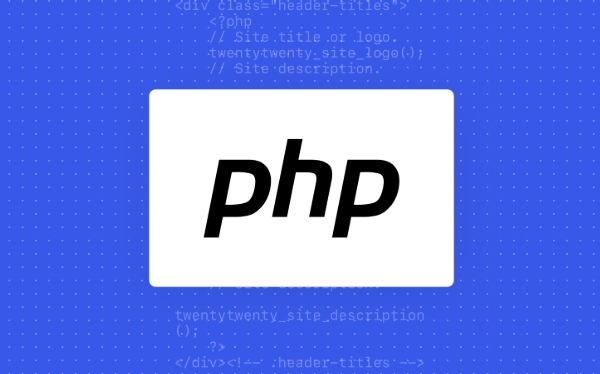 Backend Development
Backend Development
 PHP Tutorial
PHP Tutorial
 Is it possible for a PHP function to have optional parameters?
Is it possible for a PHP function to have optional parameters?
Is it possible for a PHP function to have optional parameters?
Jul 04, 2025 am 12:58 AMYes, PHP functions can have optional parameters by assigning default values in the function definition. To implement this, assign a default value to a parameter, such as function greet($name = "Guest"), which uses "Guest" if no argument is provided. 1. Optional parameters are created by setting default values. 2. Place optional parameters after required ones; otherwise, errors may occur. 3. Use null as a default when distinguishing between "not provided" and "empty" is necessary, like function displayUser($user = null). 4. Variadic parameters using ...$numbers allow handling an indefinite number of arguments, available in PHP 5.6 . These practices improve code reusability and flexibility while maintaining clarity and expected behavior.

Yes, PHP functions can definitely have optional parameters. It's a common practice and pretty straightforward to implement.

The key idea is that you assign a default value to a parameter in the function definition. If the caller doesn't provide a value for that parameter when calling the function, it will use the default instead.

Here’s how this works in real life: imagine you're building a function to generate a greeting message. You might want to allow a custom name, but fall back to a general term like "Guest" if none is provided.
function greet($name = "Guest") {
echo "Hello, $name!";
}
greet(); // Outputs: Hello, Guest!
greet("Alice"); // Outputs: Hello, Alice!This flexibility makes your functions more reusable without forcing users to always specify every argument.

How to define optional parameters
To make a parameter optional, just assign it a default value in the function declaration.
For example:
function sayHello($name = "there", $greeting = "Hi") {
echo "$greeting, $name!";
}In this case:
- Both
$nameand$greetingare optional. - The order matters — you should place optional parameters after required ones.
So this is fine:
function buildDate($day, $month, $year = 2023) { ... }But this won’t work as expected:
function buildDate($year = 2023, $month, $day) { ... }Because required parameters shouldn't come after optional ones.
Passing null as an optional parameter
Sometimes you may want to allow a parameter to be optional, but also accept null as a valid value.
You can do this by using null as the default:
function displayUser($user = null) {
if ($user === null) {
echo "No user specified.";
} else {
echo "User: $user";
}
}This is especially useful when you're dealing with objects or expecting data that could be missing.
Using variadic parameters (when number of inputs varies)
If you're not sure how many parameters will be passed, you can use the ... operator (available in PHP 5.6 ):
function sum(...$numbers) {
echo array_sum($numbers);
}
sum(1, 2, 3); // Outputs: 6This gives you a way to handle variable-length input cleanly.
So yes, optional parameters are totally possible in PHP, and very useful. Just remember:
- Put optional parameters after required ones
- Use meaningful defaults
- Consider
nullif you need to distinguish between "not provided" and "empty"
基本上就這些.
The above is the detailed content of Is it possible for a PHP function to have optional parameters?. For more information, please follow other related articles on the PHP Chinese website!

Hot AI Tools

Undress AI Tool
Undress images for free

Undresser.AI Undress
AI-powered app for creating realistic nude photos

AI Clothes Remover
Online AI tool for removing clothes from photos.

Clothoff.io
AI clothes remover

Video Face Swap
Swap faces in any video effortlessly with our completely free AI face swap tool!

Hot Article

Hot Tools

Notepad++7.3.1
Easy-to-use and free code editor

SublimeText3 Chinese version
Chinese version, very easy to use

Zend Studio 13.0.1
Powerful PHP integrated development environment

Dreamweaver CS6
Visual web development tools

SublimeText3 Mac version
God-level code editing software (SublimeText3)
 PHP Variable Scope Explained
Jul 17, 2025 am 04:16 AM
PHP Variable Scope Explained
Jul 17, 2025 am 04:16 AM
Common problems and solutions for PHP variable scope include: 1. The global variable cannot be accessed within the function, and it needs to be passed in using the global keyword or parameter; 2. The static variable is declared with static, and it is only initialized once and the value is maintained between multiple calls; 3. Hyperglobal variables such as $_GET and $_POST can be used directly in any scope, but you need to pay attention to safe filtering; 4. Anonymous functions need to introduce parent scope variables through the use keyword, and when modifying external variables, you need to pass a reference. Mastering these rules can help avoid errors and improve code stability.
 How to handle File Uploads securely in PHP?
Jul 08, 2025 am 02:37 AM
How to handle File Uploads securely in PHP?
Jul 08, 2025 am 02:37 AM
To safely handle PHP file uploads, you need to verify the source and type, control the file name and path, set server restrictions, and process media files twice. 1. Verify the upload source to prevent CSRF through token and detect the real MIME type through finfo_file using whitelist control; 2. Rename the file to a random string and determine the extension to store it in a non-Web directory according to the detection type; 3. PHP configuration limits the upload size and temporary directory Nginx/Apache prohibits access to the upload directory; 4. The GD library resaves the pictures to clear potential malicious data.
 Commenting Out Code in PHP
Jul 18, 2025 am 04:57 AM
Commenting Out Code in PHP
Jul 18, 2025 am 04:57 AM
There are three common methods for PHP comment code: 1. Use // or # to block one line of code, and it is recommended to use //; 2. Use /.../ to wrap code blocks with multiple lines, which cannot be nested but can be crossed; 3. Combination skills comments such as using /if(){}/ to control logic blocks, or to improve efficiency with editor shortcut keys, you should pay attention to closing symbols and avoid nesting when using them.
 How Do Generators Work in PHP?
Jul 11, 2025 am 03:12 AM
How Do Generators Work in PHP?
Jul 11, 2025 am 03:12 AM
AgeneratorinPHPisamemory-efficientwaytoiterateoverlargedatasetsbyyieldingvaluesoneatatimeinsteadofreturningthemallatonce.1.Generatorsusetheyieldkeywordtoproducevaluesondemand,reducingmemoryusage.2.Theyareusefulforhandlingbigloops,readinglargefiles,or
 Tips for Writing PHP Comments
Jul 18, 2025 am 04:51 AM
Tips for Writing PHP Comments
Jul 18, 2025 am 04:51 AM
The key to writing PHP comments is to clarify the purpose and specifications. Comments should explain "why" rather than "what was done", avoiding redundancy or too simplicity. 1. Use a unified format, such as docblock (/*/) for class and method descriptions to improve readability and tool compatibility; 2. Emphasize the reasons behind the logic, such as why JS jumps need to be output manually; 3. Add an overview description before complex code, describe the process in steps, and help understand the overall idea; 4. Use TODO and FIXME rationally to mark to-do items and problems to facilitate subsequent tracking and collaboration. Good annotations can reduce communication costs and improve code maintenance efficiency.
 How to access a character in a string by index in PHP
Jul 12, 2025 am 03:15 AM
How to access a character in a string by index in PHP
Jul 12, 2025 am 03:15 AM
In PHP, you can use square brackets or curly braces to obtain string specific index characters, but square brackets are recommended; the index starts from 0, and the access outside the range returns a null value and cannot be assigned a value; mb_substr is required to handle multi-byte characters. For example: $str="hello";echo$str[0]; output h; and Chinese characters such as mb_substr($str,1,1) need to obtain the correct result; in actual applications, the length of the string should be checked before looping, dynamic strings need to be verified for validity, and multilingual projects recommend using multi-byte security functions uniformly.
 Quick PHP Installation Tutorial
Jul 18, 2025 am 04:52 AM
Quick PHP Installation Tutorial
Jul 18, 2025 am 04:52 AM
ToinstallPHPquickly,useXAMPPonWindowsorHomebrewonmacOS.1.OnWindows,downloadandinstallXAMPP,selectcomponents,startApache,andplacefilesinhtdocs.2.Alternatively,manuallyinstallPHPfromphp.netandsetupaserverlikeApache.3.OnmacOS,installHomebrew,thenrun'bre
 Learning PHP: A Beginner's Guide
Jul 18, 2025 am 04:54 AM
Learning PHP: A Beginner's Guide
Jul 18, 2025 am 04:54 AM
TolearnPHPeffectively,startbysettingupalocalserverenvironmentusingtoolslikeXAMPPandacodeeditorlikeVSCode.1)InstallXAMPPforApache,MySQL,andPHP.2)Useacodeeditorforsyntaxsupport.3)TestyoursetupwithasimplePHPfile.Next,learnPHPbasicsincludingvariables,ech





